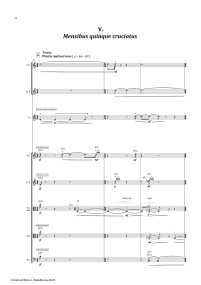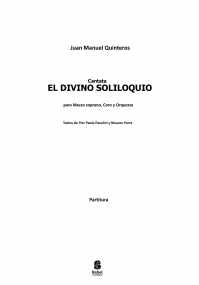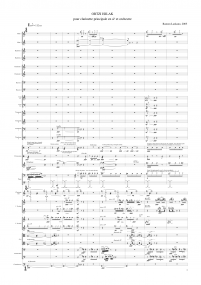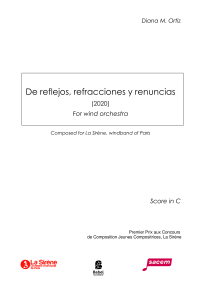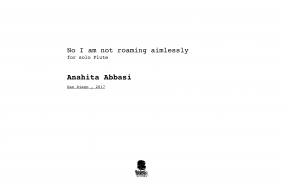Quintus angelus tuba cecinit
for 2 clarinets, trumpet and strings
12,00 €
Digital version (+0,00 €) instant download
Printed format (+14,80 € printing and shipping). Colissimo7-14 days aprox.
When you buy a score, you can contact the composer right here!
Specifications
Region
Europe
Estimated Duration
6 - 10min
Date
2019
ISMN : 979-0-2325-6938-3
Notes on this piece Quintus angelus tuba cecinit is freely inspired by the book of the Apocalypse of John that exiled on the Greek island of Patmos had the vision of the prophecy of the end of time. There are many interpretations of this book, but one thing is certain: symbolism and visionary nurture, and perhaps still nurture, the imagination of those who have dealt with it. After all we are not the first to think that this world could end up due to some catastrophe, even through ourselves.
Seven are the micropieces of Quintus angelus tuba cecinit, as are the angels, the seals, the churches of Asia Minor urged to resist the persecutions of the first century, probably by the Emperor Diocletian. The music is characterized by a strong expressionism of the timbre transforming sound into noise and vice versa. But the contrast between the air suspension of fluctuating sounds and harmonic clusters, sculpted like stone, will also be audible. The sound becomes unreal to the limit with the electronic.
In the first mouvement, I. Stella de cælo cecidit, a judgement "trumpet" announces the fifth angel and, in an ecstatic atmosphere, a star falls into the depths of the Earth. A smoke rises vertiginously from the depths, II. Clavis abyssi, obscuring, acid, the sun and the air creating vortices of sound that suck up the matter, III. Fumus abyssi: sol et aër obscuratus sunt. In the suspended and nocturnal silence, clouds of indefinite sound invade, little by little, the apparent truce, IV. Scorpionis terrae. In V. Mensibus quinque cruciatus the viola solo leads a sort of floating lament where the grosso of the orchestra seems to unite in a sorrowful song: it is the torment of the living that do not live in the right. Now the celestial harmony of Josquine de Prez, appears, as filtered and reverberated by a Gothic window, VI. Mille anni. VII. Cælum novum is the heavenly harmony that, languid, dissolves in eternity.
Add to a playlist
- Login to create your own lists
Seven are the micropieces of Quintus angelus tuba cecinit, as are the angels, the seals, the churches of Asia Minor urged to resist the persecutions of the first century, probably by the Emperor Diocletian. The music is characterized by a strong expressionism of the timbre transforming sound into noise and vice versa. But the contrast between the air suspension of fluctuating sounds and harmonic clusters, sculpted like stone, will also be audible. The sound becomes unreal to the limit with the electronic.
In the first mouvement, I. Stella de cælo cecidit, a judgement "trumpet" announces the fifth angel and, in an ecstatic atmosphere, a star falls into the depths of the Earth. A smoke rises vertiginously from the depths, II. Clavis abyssi, obscuring, acid, the sun and the air creating vortices of sound that suck up the matter, III. Fumus abyssi: sol et aër obscuratus sunt. In the suspended and nocturnal silence, clouds of indefinite sound invade, little by little, the apparent truce, IV. Scorpionis terrae. In V. Mensibus quinque cruciatus the viola solo leads a sort of floating lament where the grosso of the orchestra seems to unite in a sorrowful song: it is the torment of the living that do not live in the right. Now the celestial harmony of Josquine de Prez, appears, as filtered and reverberated by a Gothic window, VI. Mille anni. VII. Cælum novum is the heavenly harmony that, languid, dissolves in eternity.
Instrumentation
Clarinet (2)
Trumpet
String Orchestra
Trumpet
String Orchestra
Score Details
Format - A4 / US Letter
Pages - 54
Pages - 54


